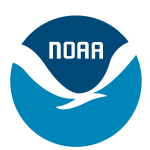- Industry: Government
- Number of terms: 30456
- Number of blossaries: 0
- Company Profile:
NOAA Coral Reef Conservation Program, National Oceanic and Atmospheric Administration, U.S. Department of Commerce
A sensory organ in chitons (Polyplacophora-Mollusca) which can be protruded and pressed against the substrate in the search for food.
Industry:Natural environment
A taxonomic group that is a division of a species. It usually evolves as a consequence of reproductive isolation of one or more populations within a species.
Industry:Natural environment
Anatomically beneath, lower, or toward the bottom (e.g., the mouth is inferior to the nose).
Industry:Natural environment
Defensive postures or other visual displays, including color changes, that function to intimidate or frighten another animal.
Industry:Natural environment
In fishes, between the rays (or spines), e.g. Interradial pigment is pigment on the membrane between the rays.
Industry:Natural environment
Pure water consists of hydrogen and oxygen, H2O. It is a binary compound that occurs at room temperature as a colorless, odorless, tasteless, transparent liquid which is very slightly compressible. It freezes at 0 degrees C and boils at 100 degrees C. It is the most important natural solvent, and frequently contains impurities, which are mostly removed by distillation.
Industry:Natural environment
The area around the mouth of an anthozoan polyp that bears from eight to several hundred tentacles.
Industry:Natural environment
The iron-containing protein (pigment) found in red blood cells of vertebrates. Hemoglobin transports oxygen from the respiratory surface (gills, lungs) to the body's tissues. It is red when oxidized.
Industry:Natural environment
